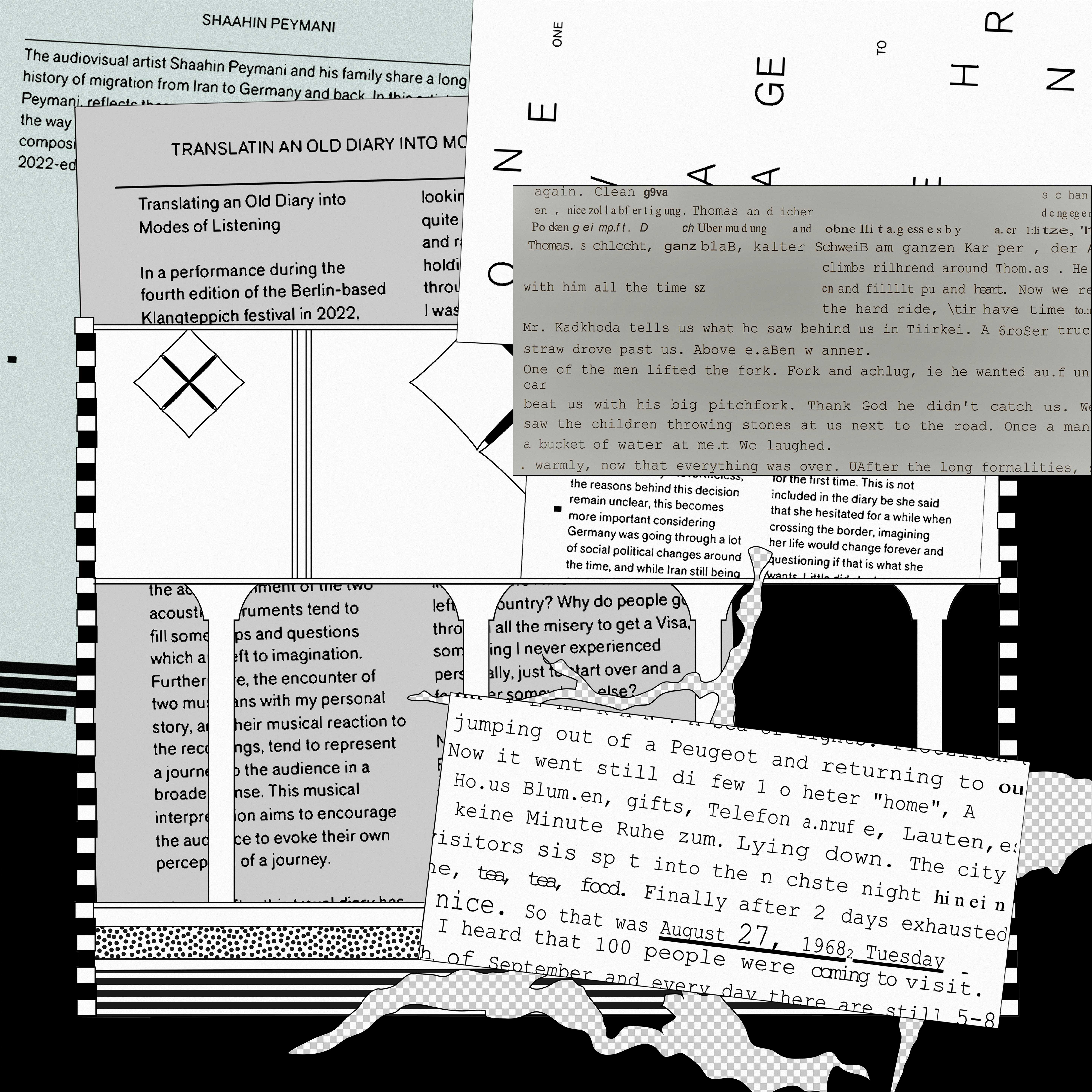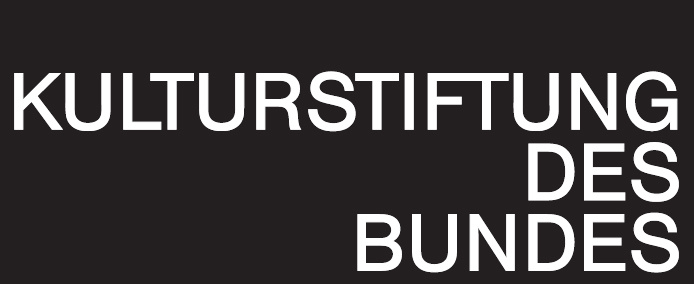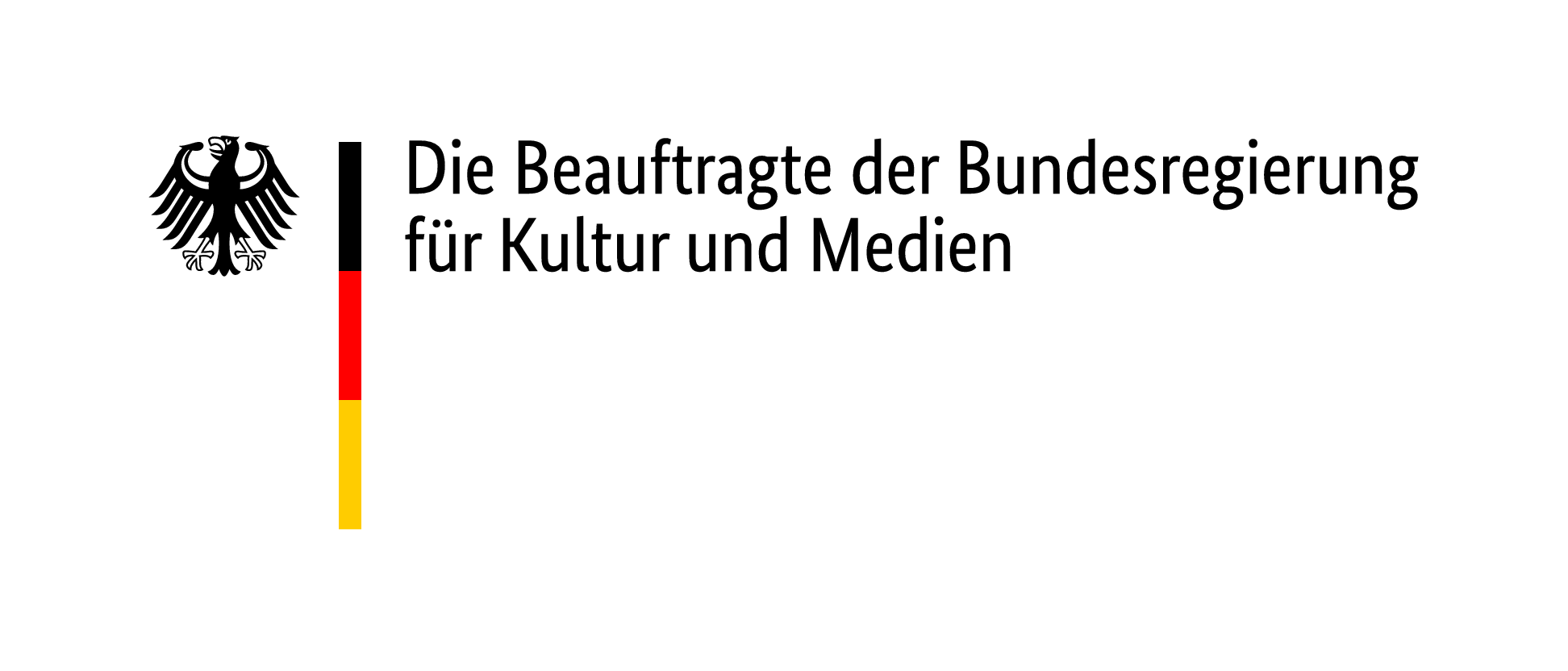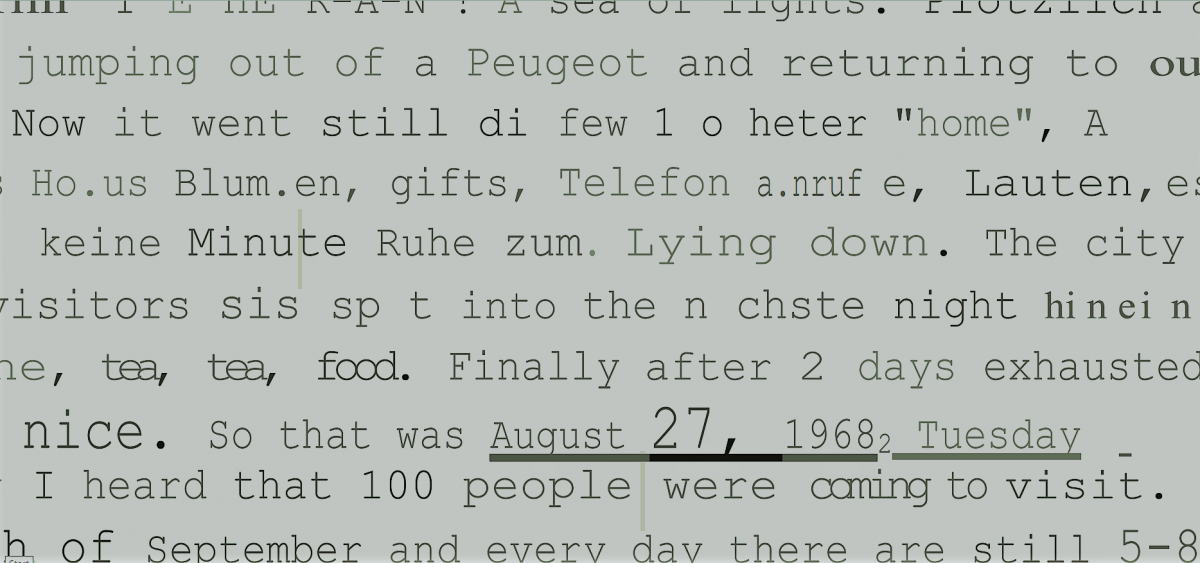
One Way Passage to Tehran
The audiovisual artist Shaahin Peymani and his family share a long history of migration from Iran to Germany and back. In this article, Peymani reflects these multiple and unusual journeys by mapping the route from his German grandmother’s migration diary alongside a composition for cello, clarinet, electronics, and tape, presented at the 2022-edition of the Berlin-based Klangteppich festival.
August 14, 1968. Elisabeth Agnes Hanafi-Yazdi, a 32-year old German woman from Bleibach, began a journey that marked the biggest decision of her life. On this day, Elisabeth and her Iranian Husband, Kazem Hanafi Yazdi, started a 10-day road trip from Wuppertal Germany towards Tehran, Iran, where they would spend the rest of their lives, eventually leading to my birth as their first grandchild in Tehran. Elisabeth never returned to Germany except to visit, until she returned to her hometown a few days before she died, where she was then buried.
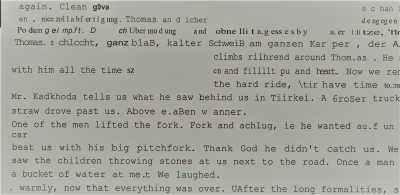
A One-Way Ticket in the Reverse Direction
Since my grandparents both died before I could ask them about this trip and their lives previous to that, and my mother was not born at the time, there are a lot of questions unanswered and left to the imagination. A typewritten diary by Elisabeth was found by my parents, covering these ten days in detail. The diary includes countries and cities passed, people met along the way, stopping points, and little details like the food they had each day. Nevertheless, the reasons behind this decision remain unclear. At the time, Germany was going through a lot of socio-political changes, while Iran was still being governed by the Pahlavi dynasty. It’s interesting to imagine how this immigration to a country in the Middle East would’ve been perceived at the time, especially in today’s world, where most displacement takes place in the other direction. For example, most students in Iran only tend to finish their studies to be able to continue at a university in Europe. In a time when everyone seems to be willing to flee from Iran, it’s hard to imagine that a reverse path has also been an option.
Through the few conversations I remember from my childhood, I know that it was initially my grandmother’s idea to move back to Iran. This becomes clear when she crossed the border to enter Iran, expressing doubts for the first time. This is not included in the diary, but she said that she remembered hesitating, imagining her life would change forever, and questioning if this was what she wanted. Little did she know that the country she was entering would soon turn into something totally different following the revolution in 1979 and the Iran-Iraq war. Also left to the imagination is how these impacts changed her perception about this journey, and how much she planned the path to Tehran to be one-way.
Translating an Old Diary into Modes of Listening
In a performance during the fourth edition of the Berlin-based Klangteppich festival in 2022, the cello player Judith Hamann, the clarinetist Florian Bergmann, and I tried to highlight some of these questions by recreating this journey through musical means. The instrumentation of the performance corresponds to the structure of the story. While a prerecorded track including found-sounds and field recordings correspond to the actual story, the accompaniment of the two acoustic instruments tend to fill some of the gaps and questions left to imagination. Furthermore, the encounter of two musicians with my personal story, and their musical reaction to the recordings, represent a journey to the audience in a broader sense. This musical interpretation aims to encourage the audience to evoke their own perception of a journey.
54 years after this travel diary was written, I, the grandson of Elisabeth and Kazem, find myself looking at this journey from a quite different standpoint. Born and raised in Tehran, I have held German nationality through my grandmother since I was born. Even though I always identified as partly German, I never intended to leave Iran, nor did I consider living in Germany. However, as Iran entered deeper and deeper into troubles every year, I began to question whether I should migrate as well. I still have doubts to this day. Is it right to leave? Especially at a time when it seems like everyone I know has already left the country? Why do people go through all the misery to get a visa, something I never experienced personally, just to start over as a foreigner somewhere else?
Nevertheless, I moved to Berlin in 2018 to begin my Master’s studies, unlike the Hanafi-Yazdi family, hoping to return to Iran with whatever accomplishment I earned during my studies. Having started as a composer and sound designer for film, I moved to Berlin to study sonic arts. Most of my work includes found sounds and field recordings. By recomposing these archival sounds with the human speech voice, I seek to explore the realm of human perception by deconstructing language and image and transforming them to the audible domain.
I use the same approach in this performance, translating an old diary into modes of listening in order to represent new perspectives on the journey.
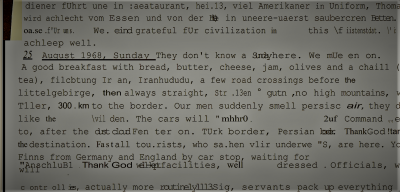
The Urge to Move Against Longing for Home
Having arrived in Germany as a double-national, I have faced most of the challenges an immigrant might go through. My unfamiliar German roots have actually made me more alienated in a country I’m supposed to belong to. By putting the two personal stories in front of each other, this performance tries to reflect on questions of identity and displacement in a time when it seems that Europe has become a central destination for a lot of immigrants from around the world. In this sense, the performance can be considered as autoethnographic, which tries to explore wider cultural, social, and political meanings through connecting it to a personal story.
The 30-minute composition for cello, clarinet, electronics, and tape is divided into several small sections or movements inspired by some highlighted points in the travel diary. While the pre-recorded track includes a collage of found sounds, field recordings, and fragments of the diary read by different voices, the three performers try to recreate a musical path from a graphical score/map, simultaneously tracing the shape of a specific journey, while also making this personal story relatable to the audience by transforming it into the audible domain. While the overall form and framework of the piece is determined, some musical details like pitch and dynamics are sometimes improvised and articulated based on points of the journey. The performers still have the freedom of translating the map based on their own experience.
These interpretations are partly based on the musician’s perspectives, not only to this specific trip, but also its broader concepts. As for the theme of the Klangteppich festival being the music of Iranians in diaspora, this performance tries to draw a crossing point between opposites: The urge to move against the longing for home. The love-hate relationship with one’s home country or their immigration destination, and the different impacts of the decision to stay from then to now.
This text is part of the Norient Special «Klangteppich: Voices from the Iranian Diaspora and Beyond», published in the run-up to «Klangteppich: Festival for music of the Iranian diaspora IV». The Special was curated and edited by Franziska Buhre. More on the projects and artists can be found here.
Klangteppich IV is funded by the Kulturstiftung des Bundes (German Federal Cultural Foundation). Funded by the Beauftragte der Bundesregierung für Kultur und Medien (Federal Government Commissioner for Culture and the Media) and the Co-Financing Fund Berlin.
Biography
Shop

Published on May 19, 2022
Last updated on April 03, 2024
Topics
A generative practice that promotes different knowledge. One that listens is never at a distance but always in the middle of the sound heard.
What happens, when artists move from one to another country? For example, when an Arab artist replaces the big tractors in her the village with big jeeps of the West.
Special
Snap
